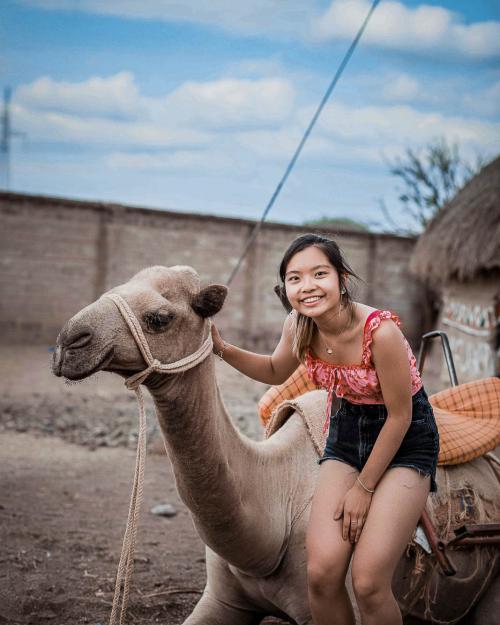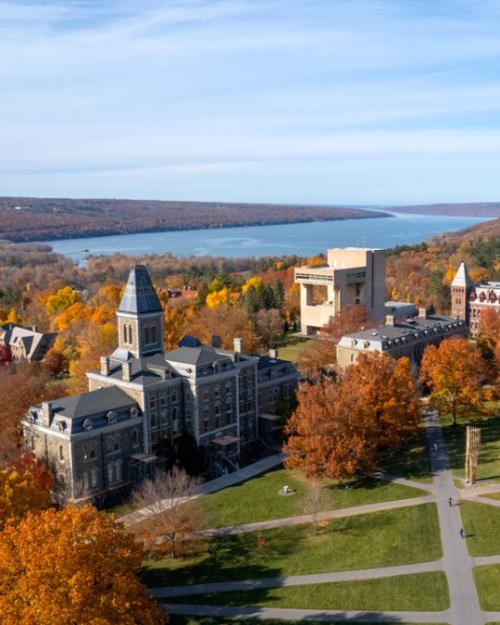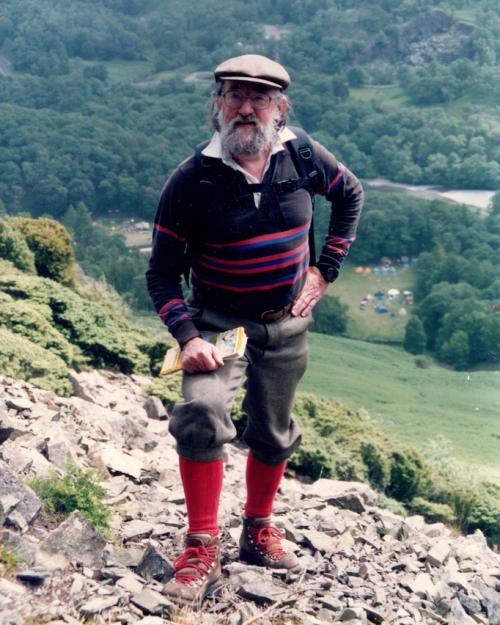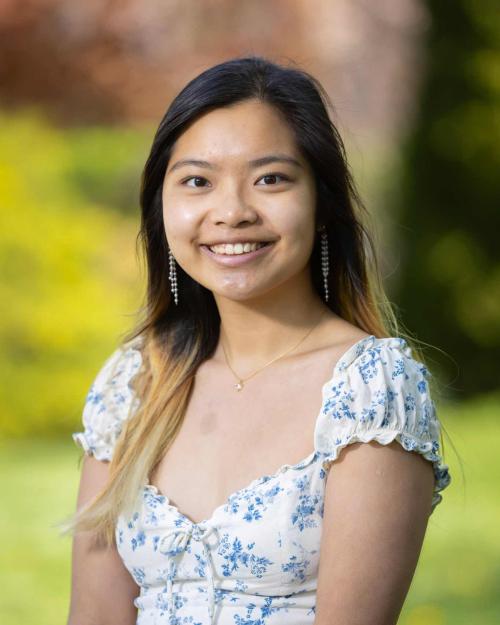Kelly Su
Biology & Society, Asian American studies
Brooklyn, N.Y.
What was your favorite class and why?

My favorite class was NS 2600: Introduction to Global Health taught by Professor Jeanne Moseley, where I learned about the impact of social determinants on health, global inequality and health disparities between high-income countries and low-and-middle-income countries. This class inspired me to pursue a global health minor and fueled my passion for eliminating healthcare disparities for marginalized populations and eradicating preventable diseases with cures, treatments and vaccinations. For my Experiential Learning Opportunity (ELO), I had the privilege of conducting global health and policy research during Cornell's Global Health Program for four weeks in Moshi, Tanzania during summer 2022. We collaborated with fourth-year Tanzanian medical students to interview emergency medicine doctors, police, motorcycle drivers and community health workers. We wrote and presented a policy case study that compiled our research, findings and recommended policy solutions on critical gaps in the Tanzanian emergency medical services system; we highlighted issues like the lack of trained first responders, hazardous transportation to the hospital, and limited health insurance coverage that led to poor health outcomes. I was confronted with the ways that structural poverty and infrastructure impacted people’s health outcomes.
What is your main extracurricular activity and why is it important to you?
As a freshman, I joined the First-Generation Student Union (FGSU), looking for a safe space for students from underrepresented backgrounds like myself. I devoted myself to advocacy and passion for helping fellow students, and I became president of FGSU. We sought to provide social, academic and professional guidance, creating a podcast to share resources and organizing an annual mentorship program that pairs underclassmen with upperclassmen. To provide professional development opportunities, we hosted a professional speaker series with our first-gen alumni network and held a five-part series on networking and consulting. In addition, we collaborated with various groups including the Basic Needs Coalition to provide access to essential needs, Women in Computing at Cornell on intersectional identities in the workplace, school and beyond and FLIP National, a nonprofit organization, to promote equal opportunity for first-generation low-income (FGLI) students in higher education. To unite the community further, we also led social events such as apple and pumpkin picking, crafts, and community dinners. To celebrate the accomplishments of seniors who are the first in their family to graduate college, I also led the planning and execution of the first-generation graduation ceremony.
Also, during the rise of anti-Asian hate and violence during the COVID-19 pandemic and the Atlanta spa shootings, I noticed a gap in Cornell’s Asian American organizations, which focused more on social and cultural aspects of our identity, and a significant need for a safe space to discuss complex and meaningful sociopolitical topics relevant to the APIDA community. In my junior fall, I reestablished Asian Pacific Americans for Action (APAA), a club that seeks to politically empower and advocate for the needs of APIDA students and further Asian/American activism on campus. I am extremely proud of our growth as a club, which has since organized two fundraisers and built coalitions with other groups of color and social justice groups to build solidarity and community. We have educated students with teach-ins on the history of Asian American activism, labor, colonization, imperialism, civic engagement, political participation and affirmative action. In March 2024, I also organized a group of 15 Cornell students to attend the annual East Coast Asian American Student Union Conference at Yale University, participating in workshops and engaging with students from 50+ other universities. For our efforts, we received the “Outstanding Contribution to the APIDA Community” award two years in a row at the APIDA Gala from the Asian & Asian American Center.
What have you accomplished as a Cornell student that you are most proud of?
As a first-generation and low-income student, study abroad has been an extremely formative, eye-opening and integral part of my Cornell experience. I had the privilege of participating in the Global Health Summer program in Moshi, Tanzania, the Danish Institute for Study Abroad (DIS) program in Copenhagen, Denmark for a semester, and the Heat Waves and Global Health spring break program in London, United Kingdom. In Copenhagen, DIS’s unique classes and approach to experiential and hands-on learning allowed me to partake in weekly field studies, learn how to do surgical knots and different types of sutures, how to identify organs and basic pathology on CT scans and ultrasounds, talk to healthcare practitioners about their specialties and learn about different healthcare systems. I joined the students of color affinity group and student media team as a photographer. I loved being able to capture personal memories with my friends and host family. I lived in a homestay in a suburban area, which allowed me to fully immerse myself into Danish society. One of my fondest memories was when my host family organized a traditional Danish birthday for me. My host mom and sister baked traditional Danish layer cake and birthday buns and decorated the house with Danish flags. I invited my friends over for a hyggeligt time. I also went to Legoland and the Hans Christian Andersen museum with my host family!
In London, I learned about how climate change, particularly heat waves, has greatly affected people of color in working class neighborhoods. We also learned about how race has shaped environmental injustice, access to green spaces, social housing, and urban living.
In Moshi, I challenged myself to navigate through unfamiliar culture norms and hyper-vigilance as an Asian woman. I reflected on my worldview and preconceived notions of Tanzania. I’m proud to say that I was the best Swahili speaker in my cohort and I loved interacting with locals, especially bargaining! My experiences have profoundly broadened my worldview and instilled a critical approach to global health. Seeking to understand how others experience their lives facilitated a deep understanding of cultural differences, allowing me to connect with individuals of entirely different backgrounds with empathy, compassion and an open-minded attitude. These experiences strengthened my cross-cultural, interpersonal and communication skills. The most meaningful part was building relationships and learning about each other’s cultures. I recognized that our similarities unite us much more than our differences set us apart.
Who or what influenced your Cornell education the most?
The College of Arts and Sciences gave me the freedom of exploring my educational interests and I enjoyed its interdisciplinary approach to learning. I also took three semesters of Mandarin Chinese, which developed my native fluency. The biology and society, Asian American studies, anthropology and global health departments and faculty have greatly informed my scholarship, thinking and personal development. They helped me become more well-read, gain a better understanding of my identity and comprehend where I stand in the world. In addition, ethnic studies classes helped me understand intersectional identities and the larger structural forces that shaped my and others’ experiences in America.
Where do you dream to be in 10 years?
In 10 years, I dream that I have successfully become a physician, after residency and fellowship and continued with my journey of advocacy and learning. I hope to join Doctors without Borders and provide free services to underserved communities. I can also see myself engaged in public and global health, perhaps through research and perhaps with the Centers for Disease Control and Prevention.
Every year, our faculty nominate graduating Arts & Sciences students to be featured as part of our Extraordinary Journeys series. Read more about the Class of 2024.





